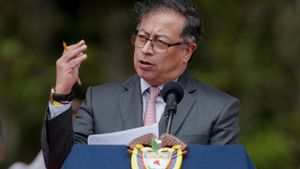The technological and economic rivalry between the US and China has reached new heights, marked by dramatic developments, military posturing, and burgeoning advancements in artificial intelligence. The Biden administration is grappling with complex challenges as it formulates its policy toward China, all amid the looming shadow of the previous administration's hardline stance.
Former President Donald Trump adopted aggressive measures aimed at containing China, and this approach appears to have roots deep within the Biden administration’s current strategy. The US has actively pursued military containment, particularly concerning Taiwan, and has similarly limited economic ties, especially concerning high-stakes sectors like semiconductors. The winding path of US-China relations has recently seen significant actions, particularly as the final year of the Biden administration drew to a close.
According to reports, the Biden administration hastened military aid to Taiwan as part of its strategy to counteract Chinese influence. This included the authorization of multiple arms sales, valued at nearly $571.3 million for military orders alone. The US has continued to add to Taiwan's military capabilities, which external analysts view as provocation intended to send clear signals to China.
The $571.3 million military package is just one of several dealings occurring as the Biden administration approaches its last moments. These arms sales, which included key technologies like the Link-16 data transmission systems, serve not just to bolster Taiwan's defenses, but also to create tension with Beijing. Zhu Fenglian, spokesperson for the Taiwan Affairs Office of China, criticized these actions as encouragement of separatism, asserting the need for resolute measures to safeguard China’s interests.
Stronger military ties between the US and Taiwan translate to elevated risks, with analysts warning of potential escalations. The Chinese military expert Song Zhongping remarked, “These arms shipments solely preserve Taiwan’s current military capabilities without providing substantial enhancements.” Yet, the geopolitical chess game continues as both sides remain unwilling to back down.
On the economic front, the US has imposed extensive restrictions on trade with China, particularly targeting technology and semiconductors. The Biden administration implemented restrictions on 200 American companies exporting components to China, especially those involved with advanced semiconductor production. This was viewed as expedient and necessary amid fears of economic security threats. The US also banned imports from 29 companies based on allegations of forced labor practices.
Inside China, reactions to these US maneuvers reflect deep concerns. The Chinese Ministry of Commerce voiced strong opposition to the US sanctions, denouncing them as violations of rights and harmful to legitimate business interests. Following recent arms sales to Taiwan, China announced its own set of retaliatory measures, sanctioning American defense companies and freezing their assets within the country.
The tit-for-tat sanctions symbolize the fraught atmosphere surrounding technological competition. Notably, twelve American defense firms, including Lockheed Martin and Raytheon, faced significant sanctions, freezing their assets and prohibiting business interactions with Chinese entities, showcasing the increasing precision of Beijing's programmatic countermeasures.
Meanwhile, China is not simply adopting defensive postures; it is also positioning itself as a contender on the AI front. The emergence of the Chinese start-up DeepSeek has caught the world’s attention, providing generative AI capabilities comparable to those of U.S. firms, but at much lower costs. This development has sparked serious discussions around AI regulations and competitive tensions within the tech sector.
Head of NAVER Cloud's AI Innovation Center, Jungwoo Ha, highlighted the potential for Korea to leverage the situation, stating, “The important time has come for the government and companies to make large-scale investments faster to leap forward as one of the three global AI powerhouses.” Ha suggested the rapid developments signify the shift to a bipolar system where China stands as the primary challenger to U.S. hegemony.
This spirited competition extends to legislative actions within the US Congress. Senator Josh Hawley recently introduced legislation aimed at severing collaborative efforts between U.S. firms and China on AI. This bold initiative reflects the nervousness surrounding the export of AI technology and intellectual property to China, encapsulating the view held by many lawmakers who see every inch of cooperation as potentially hazardous.
Japan too has taken steps aligned with these tensions. The Japanese government recently moved to impose tech and trade controls on 18 Chinese companies, prompting stern warnings from Beijing about the retaliatory measures it would invoke to protect its interests.
China’s Ministry of Commerce has issued statements asserting its continued commitment to defending national interests against perceived overreach from foreign trading partners. The broader scope of action against China reflects the countries’ rising stakes and how this technological and economic rivalry may define the geopolitical arena for years to come.
Experts predict the situation will escalate significantly if Trump maintains his hardline stance against China upon returning to office. The economic ramifications for both countries are steep, as are the stakes of technological leadership. Should the path of confrontation intensify, the global market will likely see ripple effects felt across various sectors, driving businesses to adapt and realign their strategies as they bracingly navigate uncertain waters.
Conclusively, as the clock ticks toward heightened competition, future developments will not only shape the fate of US-China relations but could redefine the rules of global engagement across technological and economic domains. With concerns mounting over trade practices, military human rights, and geopolitical stability hanging precariously over the current dynamics, the global community will be cautiously watching how the narratives and actions continue to evolve.



